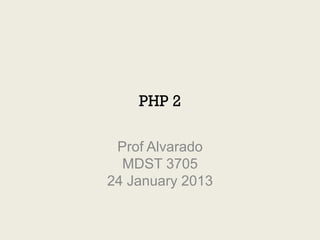Mdst3705 2013-01-24-php2
•Télécharger en tant que PPTX, PDF•
0 j'aime•482 vues
The document discusses the PHP programming language, noting that it uses variables, values, expressions, and other constructs to model and create "worlds" through code, and introduces some basic PHP concepts like variables, arrays, control structures, functions, and sigils. Exercises are provided to emulate the 10 PRINT program in PHP and learn about arrays, control structures, and functions by riffing on the 10 PRINT model to produce other outcomes.
Signaler
Partager
Signaler
Partager

Recommandé
Contenu connexe
Similaire à Mdst3705 2013-01-24-php2
Similaire à Mdst3705 2013-01-24-php2 (20)
NOVA Data Science Meetup 1/19/2017 - Presentation 2

NOVA Data Science Meetup 1/19/2017 - Presentation 2
Language as social sensor - Marko Grobelnik - Dubrovnik - HrTAL2016 - 30 Sep ...

Language as social sensor - Marko Grobelnik - Dubrovnik - HrTAL2016 - 30 Sep ...
Adnan: Introduction to Natural Language Processing 

Adnan: Introduction to Natural Language Processing
Plus de Rafael Alvarado
Plus de Rafael Alvarado (20)
Mdst3705 2013-01-24-php2
- 1. PHP 2 Prof Alvarado MDST 3705 24 January 2013
- 2. Business • Reference materials posted • Use the principle of “TMI filtering” – Filter out what has not been covered – Be comfortable with knowing a little
- 3. Review • Programming languages were invented so that people could more easily control computers – Human like to interact with objects in the world through language • But like natural languages, programming languages involve worlds – Worlds are implied by code – Worlds are modeled in code – Worlds are created by code
- 5. We live in “Barricell’s Universe” A world that has emerged from the use of a a specific kind of computer
- 6. PHP as a language • Variables – Variables are like nouns – Refer to locations in memory (pigeon holes) • Values – Values are like meanings – Strings and numbers that are stored in memory • Expressions – Expressions, e.g. $x + 1, are like clauses – Expressions always “return” a value
- 7. Sentences • Code is written in sentences called “instructions” Imperative and inquisitive modes – Imperative • $x = $y; // Like saying, “Let $x = $y” • $x = 1 * 50 + $z; – Inquisitive • If ($x == 1) {} // Like asking, “Is $x equal to 1?”
- 8. Sigils • $ as a prefix to variables – Common in languages – Perl, Java, JavaScript – Useful mnemonic device – avoids “Hungarian notation” • Derives from medieval and renaissance magic – Sigil as a seal representing an angel or demon – a “logo” • Also used as a personal logo
- 9. Todays Exercises • Emulate the 10 PRINT program in PHP • Learn about arrays, control structures, and functions • Riff on the model to produce other outcomes
- 10. Resources • PHP – Manual from PHP’s Home Page – PHP for Absolute Beginners • HTML and CSS – W3Schools